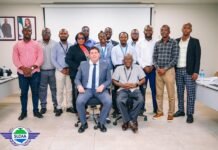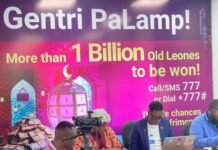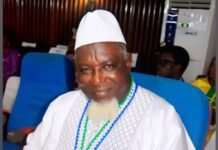By Amin Kef (Ranger)
According to FORBES AFRICA, Sierra Leone’s President Julius Maada Bio has once again attracted international recognition for his visionary leadership, as captured in the April/May 2025 edition of the magazine under its Africa Undiscovered series. In its feature, FORBES AFRICA commended the President’s far-reaching reforms in education, food security, gender equality and sustainable economic growth, positioning Sierra Leone as a nation on a transformative path.
FORBES AFRICA stated that since assuming office in 2018 and commencing his second term in 2023, President Julius Maada Bio has made human capital development the cornerstone of his governance agenda. The Magazine highlighted that his personal journey, from a modest rural upbringing to the presidency, has inspired a governance philosophy rooted in access, equity and empowerment. Central to this vision, FORBES AFRICA reported, is the President’s flagship Free Quality Education (FQE) initiative, which he regards as his proudest achievement.
“When I took office, I promised a ‘New Direction’; a decisive shift from inefficiency to empowerment through education,” President Bio told FORBES AFRICA. “In a country where many couldn’t afford school fees as low as $20, we made education a right, not a privilege.”
The Magazine further noted that within just four months of taking office, the Bio administration launched FQE, significantly improving access to education across Sierra Leone, particularly for girls. As a result, FORBES AFRICA pointed out that interest in science and technology among young women has surged and the President’s education reforms have received international acclaim. In recognition of those efforts, FORBES AFRICA highlighted that President Bio now serves as Co-Chair of the United Nations Transform Education Summit.
Touching on food security, FORBES AFRICA revealed that the President’s second term prioritizes the Feed Salone initiative, a strategic response to global food supply disruptions like the Ukraine conflict. According to the publication, this policy is aimed at harnessing Sierra Leone’s 5 million hectares of fertile land and abundant rainfall to promote climate-smart agriculture and reduce the country’s dependence on food imports.
FORBES AFRICA quoted President Bio as saying, “Food security is not just about ending hunger. It’s about resilience and national dignity. Through ‘Feed Salone,’ we are not only growing what we eat, but we are also building an economy that can withstand global shocks.” The magazine noted that the initiative targets 500,000 new jobs by 2030 and aspires to move Sierra Leone into middle-income status by 2039.
On gender equality, FORBES AFRICA underscored the President’s landmark Gender Equality and Women’s Empowerment Act, which mandates a minimum of 30% female representation in leadership and governance. The publication observed that this law is already making a profound impact in traditionally male-dominated sectors such as education and engineering. According to the magazine, programs such as STEM scholarships and free education for girls are breaking entrenched barriers.
FORBES AFRICA also highlighted the success of the “Hands Off Our Girls” campaign, spearheaded by First Lady Fatima Bio, which has led to a 30% drop in teenage pregnancies in target communities. Reforms around property rights, access to microfinance and protections against gender-based violence were also noted as key achievements.
“Empowering women isn’t charity; it’s smart economics,” President Bio told FORBES AFRICA. “Women are the backbone of families and communities and their full inclusion enriches our national fabric.”
The magazine emphasized that while mining remains central to the economy, the Bio administration is pushing aggressively for economic diversification, especially in manufacturing, agriculture and infrastructure development. FORBES AFRICA reported that investments in local production, from cooking oil to construction materials, are already reducing import dependency and creating much-needed jobs.
In terms of foreign investment, FORBES AFRICA revealed that Sierra Leone’s commitment to governance reform is attracting international capital. The magazine cited the Government’s successful mobilization of $480 million through the Millennium Challenge Corporation for energy infrastructure and nearly $1 billion in pledges from U.S. institutions for additional energy and airport projects.
“We’ve climbed over 20 spots on the global corruption index,” President Bio told the magazine. “This sends a clear message to the world: Sierra Leone is open for business, and we are building a stable, transparent environment where investors can thrive.”
FORBES AFRICA also detailed the President’s Medium-Term National Development Plan (2024–2030), describing it as a comprehensive blueprint aligned with the UN Sustainable Development Goals (SDGs). The plan focuses on public sector reform, vocational training, technological innovation and critical infrastructure to drive long-term, inclusive growth.
In a closing commentary, FORBES AFRICA quoted President Bio as saying, “As we build schools and farms, we’re also building hope. By feeding our people, educating our children and empowering our women, we are ensuring Sierra Leone’s rise on the global stage.”
The magazine further stated that President Bio extended a warm invitation to global investors and development partners, describing Sierra Leone as a stable, resource-rich country with untapped potential. With robust infrastructure improvements, sound economic indicators and a leadership committed to transparency, FORBES AFRICA noted that the country is well-positioned for long-term investment.
In conclusion, FORBES AFRICA praised President Julius Maada Bio for steering Sierra Leone toward sustainable development, inclusive prosperity and global relevance. With clear vision and measurable progress, the magazine asserted that Sierra Leone, under his leadership, is no longer just a country with potential—it is, indeed, a nation in motion.




